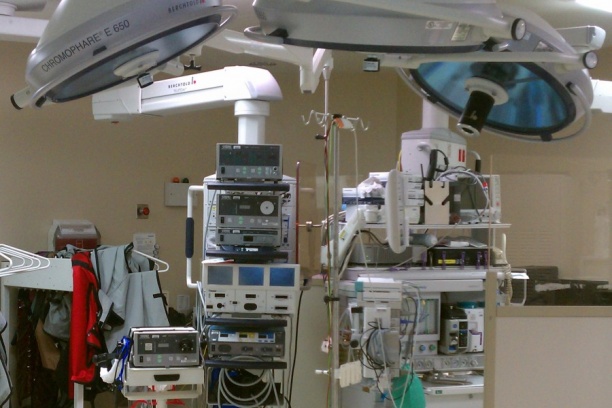Established in 1985, the Vanderbilt Vascular Laboratory was the first ever to provide a cohesive vascular diagnostic center at Vanderbilt University Medical Center. Hence, the dominant source for inpatient and outpatient vascular testing with ultrasound is accomplished at the Vanderbilt Vascular Laboratory. Accreditation by the Intersocietal Commission for the Accreditation of Vascular Laboratories (ICAVL) is established for cerebrovascular testing as well as venous testing.
The Vanderbilt Vascular Laboratory performs 4,000 vascular studies annually and is supported by four full-time and part-time RVTs. In addition, the Vascular Laboratory supports intraoperative studies and has been a basis for a substantial amount of ultrasound-directed procedures, most notably the placement of inferior vena cava filters at the bedside. During the fellowship, the trainee acquires experience with non-invasive modalities, as well as the ability to provide interpretation and the skills needed to establish or direct a vascular laboratory.
Ongoing research emphasizes endovascular grafting for aortic aneurysms and peripheral vascular disease. Endovascular grafting was initiated in 1993 and has rapidly expanded. Additional endovascular grafting projects are underway in this exciting new area in the specialty of Vascular Surgery.
Basic Science Research
Basic science research on enhancement of the patency of vascular bypass grafts has led to the identification of a protein that is felt to be involved with relaxation of smooth muscle associated with vascular bypass grafts and other smooth muscle tissue. These efforts, directed by Dr. Brophy, are funded through NIH and the Veterans Affairs and are being expanded through bioengineering collaborative efforts to develop therapeutic agents in the treatment of fibrosis, inflammatory disorders, and epithelial cancers.
Clinical Research
- Autologous stem cells in critical limb ischemia.
- Endovascular repair using the Talent Abdominal Stent Graft System in abdominal aortic aneurysms (Vitality)
- STAPLE-2 pivotal study of the Aptus Endovascular AAA Repair System
- Clinical evaluation of the GORE TAG Thoracic Endoprosthesis in the primary treatment of descending thoracic aortic aneurysms (TAG 05-02)
- Positive impact of endovascular options for treating aneurysms early
- Clinical study comparing use of the modified bifurcated EXCLUDER Endoprosthesis to open surgical repair in the primary treatment of infrarenal abdominal aortic aneurysms (AAA), Protocol AAA-99/04 Continued Access
- Embolic Protection with Reverse Flow (EMPiRE) Study of The GORE Neuro Protection System in Carotid Stenting Of Subjects At High Risk For Carotid Endarterectomy.
- FS2 versus manual compression on haemostatic efficacy during vascular surgical procedures.
- An exploratory double-blind, placebo controlled, randomized, 12-Week oral dose study to evaluate the effects of MK-0736 on atherosclerotic disease biomarkers in lower extremity plaque excised from patients with peripheral arterial disease.
- Plaque removal versus open bypass surgery for critical limb ischemia (PROOF)
- CHOICE: Carotid Stenting for High-Risk Surgical Patients.
- VIVA Study: The ViVEXX Carotid Revascularization Trial (VIVA) for high surgical risk patients with extracranial carotid artery stenosis using the Bard ViVEXX Carotid Stent and Emboshield Cerebral Protection Device.
- CREATE PAS: Carotid revascularization with ev3 arterial technology evolution post approval study (CREATE PAS).
